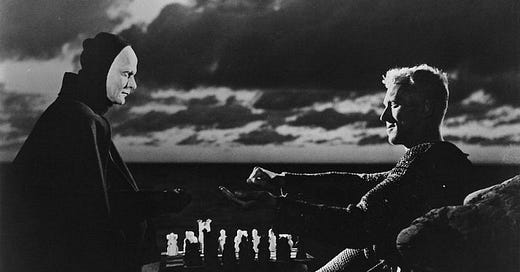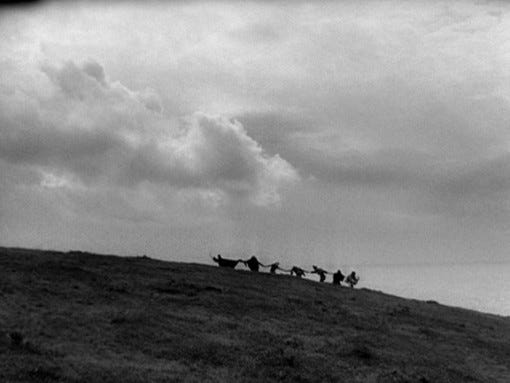I Finally Watched The Seventh Seal (1957)
Ingmar Bergman’s masterpiece is a look at dealing with our own mortality.
Ingmar Bergman’s The Seventh Seal is one of those films I constantly read about inspiring many other directors, but never got around to seeing. It’s kind of like how seemingly every science-fiction movie is inspired by 2001: A Space Odyssey, and when you finally see it you understand why. The Seventh Seal is so inspirational that Sweden put a behind the scenes image of the Swedish director on the 200 Kronor bill. The film seems to be the inspiration for many existential and experimental films -- and after seeing it, it’s easy to understand why. It’s a masterfully crafted philosophical, existential and experimental film that paved the way for so many other films of its kind.
Is there a God? If there is, why is he remaining silent in the face of all this death and destruction? Why would he cause it? Is there an afterlife? Am I worthy of being in the afterlife if I’ve lived a life of regret? These are all questions we’ve likely asked ourselves. Bergman asks the same, and his conclusion is something we’re all going to deal with.
The 1957 film is about a knight, Antonious Block (Max von Sydow), who is headed back home after his participation in the crusades. He contemplates life and seeks answers about the existence of God as he plays a game of chess with Death (Bengt Ekerot) during the bubonic plague.
The film is an onion of complex layers — showcasing so many while doing so little. Throughout the film Block expresses regrets and reflects on his actions during the Crusades. “I cry out in the darkness but it’s as if no one is there,” Block says to Death. He ponders the existence of God, and the philosophical questions of the possibility of a higher entity while being surrounded by so much death.
Death acts as the perfect backdrop for this film. Akin to Lost in Translation’s setting of Tokyo, the bubonic plague is an inescapable setting that surrounds Block, constantly reminding him of death and showcasing the many philosophies surrounding one’s own mortality. Though this is an out-of-text analysis — I speculate Bergman contemplated these things quite frequently upon reflecting about his own actions and his fascination with Adolf Hitler as a youth.
The script — also penned by Bergman — is comparable to Chinatown in that it is void of redundant scenes or any self-indulgences. It’s one of the very few scripts I’ve read in which each action line, piece of dialogue and each scene drives the story forward — pressing those existential questions.
Block is surrounded by death every step of the way. Thieves steal from the deceased as people turn against one another all for survival. In the same sequence where we meet these thieves, a duo of actors, Jof (Nils Poppe) and Mia (Bibi Andersson) are performing in town and providing a form of escapism for the townsfolk. Their act is interrupted by a group of self-harming monks who claim God is punishing people with the plague. While it’s true this was a common sentiment during the plague, the point of the sequence is to remind the audience and the characters that death is inescapable and surrounding us.
Block later finds himself a bystander to a village who is about to set an innocent woman on fire, accusing her of bringing the plague to the town by the orders of the devil. Block says “I want to meet the devil. I want to ask him about God. He, if anyone, must know.” But among these constant reminders there is the theme of life, hope and the existence of God. The actors, Jof and Mia are crucial in solidifying this theme. They’re pure, usually brightly lit with an upbeat and happy emotional tone to each scene when they’re alone together. In a world full of death, they’re the only people to conceive a child that the audience sees. They likely represent the religious forms of Joseph and Mary acting as beacons of hope for Block.
The squire, Jöns (Gunnar Björnstrand) is equally important in showcasing the different philosophies in the face of death. He is headstrong and resilient when surrounded by death — giving advice to the blacksmith (Ake Fridell) not to think about death when he sees it. This is showcased when the group finds a man in the middle of the forest who claims he has the plague. He writhes in pain, screams in agony and begs for comfort before his imminent death, only to be met with the squire telling him it is meaningless to give him water. The group then watches as the man slowly dies. Everyone takes their eyes off the man, except the squire.
At the end of the film the crew gets to their destination — Block reaches home and reunites with his wife, Karin (Inga Landgré). She sets the table for breakfast and recites Revelation 8:1–6.
“And when he had opened the seventh seal, there was silence in heaven about the space of half an hour.”
The Idea of God’s silence that has been haunting Block his entire journey home is met with a knock at the door. A knock which is Death itself. Block immediately prays and pleads to God to show mercy while the squire tells him his pleas will be unheard. In a movie filled with an emotional journey of questioning and contemplating the existence and silence of God, the characters are only given one certainty.
And in the last scene — which gives us the film’s most iconic shot — Jof watches the characters do the dance of death.
“The grim master leads with scythe and hourglass… they move away, away from the dawn, in a solemn dance, away to the dark country.”
And while watching that dance, that one certainty makes itself known.
Death comes for us all.





